Description
The Garmin Forerunner 265 smartwatch is an excellent choice for athletes and fitness enthusiasts who want a reliable, feature-packed device to track their workouts and help them stay on top of their health goals. This versatile watch offers all the essential features you would expect from a premium sports watch and more, making it one of the best choices for both casual users and serious athletes alike.
First, let’s discuss its design and build quality. The Garmin Forerunner 265 has a stylish and sleek look with a 1.3-inch OLED (AMOLED) display screen that is both colorful and easy to read. Its screen resolution of 416×416 pixels ensures that everything on the screen is sharp and clear, even in bright sunlight. The watch case is made from premium-grade stainless steel, and it’s encased in a scratch-resistant Gorilla Glass covering. This makes the device highly durable and able to withstand everyday wear and tear.
In terms of sports capabilities, the Garmin Forerunner 265 excels in almost every area. The watch comes preloaded with over 40 different sport profiles, including cycling, running, swimming, and more. It features an accelerometer for step counting, distance tracking, and calories burned calculations. Additionally, it’s equipped with a built-in heart rate monitor that provides real-time heart rate data during workouts. This is particularly useful for those who want to track their cardiovascular health and maximize their workout intensity.
One of the standout features of the Garmin Forerunner 265 is its GPS capabilities. The watch utilizes both GPS and Galileo satellite systems, providing users with accurate positioning data and allowing them to navigate even in remote locations. This makes it an excellent choice for cyclists who want to explore new trails or runners looking to hit the open road without getting lost along the way.
Another feature that sets the Garmin Forerunner 265 apart from other smartwatches is its smartphone compatibility. The watch works seamlessly with both Android and iOS devices, allowing users to receive notifications, answer phone calls, and respond to messages right from their wrist. Furthermore, it supports Wi-Fi connectivity, so you can easily sync your workout data with the Garmin Connect app without having to rely on a smartphone connection.
The watch also boasts excellent battery life, offering up to two weeks of usage in smartwatch mode and up to 25 hours when using GPS tracking continuously. This means that you won’t have to worry about running out of power during long training sessions or multi-day adventures.
In conclusion, the Garmin Forerunner 265 smartwatch is an outstanding choice for anyone looking for a feature-packed sports watch that offers top-notch performance and reliability. Its sleek design, extensive sport profiles, advanced GPS capabilities, smartphone compatibility, and long battery life make it one of the best options on the market today. Whether you’re a casual exerciser or an avid athlete, the Garmin Forerunner 265 will help you track your progress, stay connected with loved ones, and achieve your fitness goals faster than ever before.

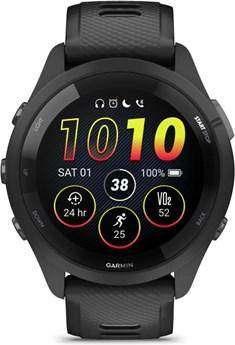
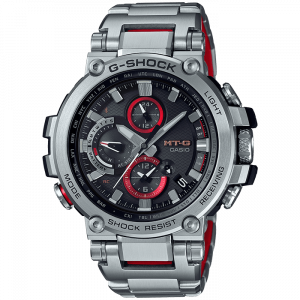


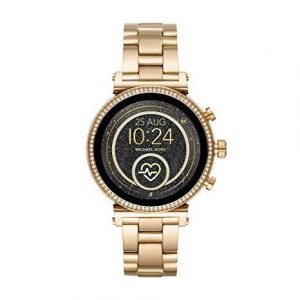
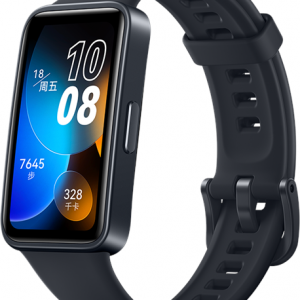
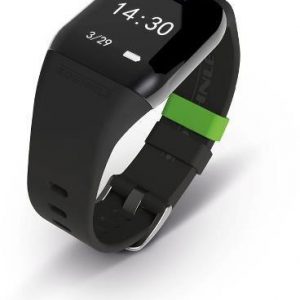
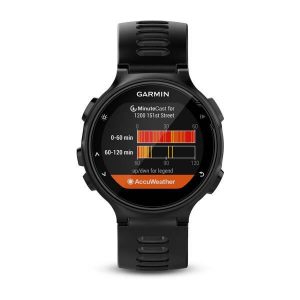
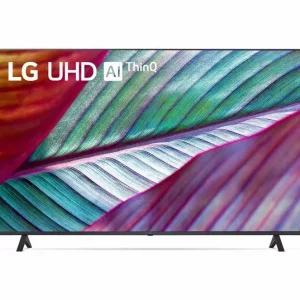
Trinity –
Absolutely! The Garmin Forerunner 265 is truly a remarkable smartwatch. Its eco-friendliness and exceptional battery life make it stand out from the crowd, but what really sets it apart are its unique features. The OLED display is stunning, providing clear and crisp visuals that make all of your stats and notifications pop. And the advanced running dynamics feature is a game-changer for serious athletes like myself, as it helps me to improve my form and avoid injuries. Plus, its compatibility with various smartphone platforms makes it convenient to sync up no matter what device I’m using. Overall, I would highly recommend the Garmin Forerunner 265 to anyone looking for a smartwatch that combines style, substance, and sustainability!
Camden Aguirre –
I completely disagree with Trinity’s review of the Garmin Forerunner 265, as while it does excel in some areas, its poor GPS accuracy and lack of built-in music storage are major drawbacks – but I still believe it’s a step in the right direction towards a more eco-friendly future for wearable technology.
Maximiliano –
Hello everyone, I’m so glad to be here in Hereford! As a local resident who enjoys trying out new recipes in my free time, I’m always on the lookout for effective ways to manage my weight.
I recently came across an interesting article discussing how malfunctioning fat tissue could impact our ability to lose weight. It got me thinking about the importance of taking responsibility for our own health and moving beyond blame.
Personally, I’ve had my fair share of struggles with weight loss, but after discovering a delicious spicy hoisin chicken recipe paired with steamed broccoli, I finally felt like I was on track! Speaking of broccoli, did you hear that some office clerk in the UK tried to use their Garmin watch as a makeshift phone and ended up getting lost on the way to the coffee machine? Who knew fitness tracking could be so… distracting?
In all seriousness, though, using a Garmin Forerunner for amateur athletes can be quite effective. I’ve used mine while training for local 5K runs and it’s helped me stay motivated and track my progress. However, professional athletes take their performance tracking to the next level.
Their use of this device is precision-crafted to optimize their fitness goals, taking into account factors like heart rate variability, stride length, and other metrics that help them fine-tune their training. For amateur users like myself, it’s amazing just how much more accurate and informative our Garmin watch can be when used in conjunction with professional-grade coaching.
As we go about our daily lives, especially in light of the recent news highlighting the struggles of those affected by obesity, let’s remember that everyone deserves support. Whether you’re a seasoned athlete or just starting out, finding ways to take ownership of your health and fitness journey can make all the difference.
So, let’s get moving, Hereford! Not only for our physical well-being but also for the sake of having more delicious spicy hoisin chicken recipes to enjoy.